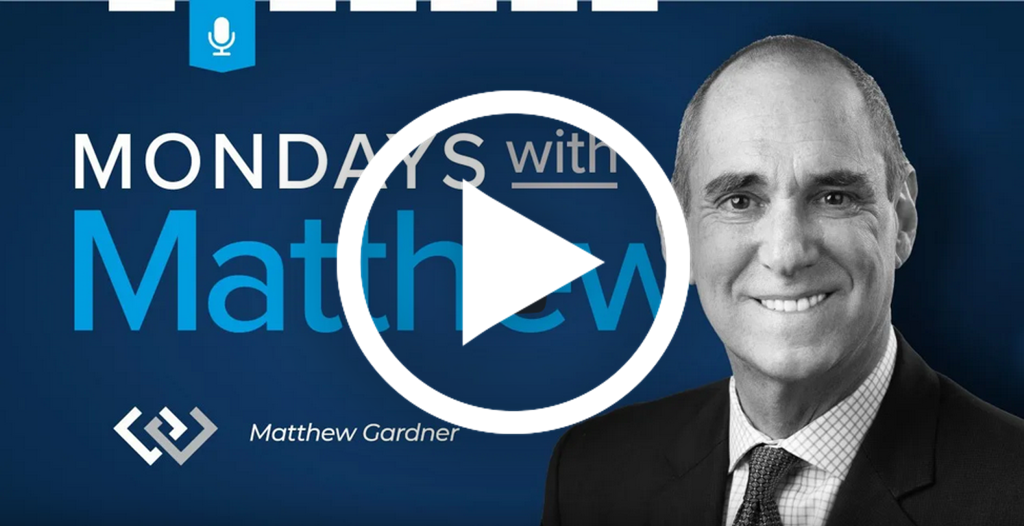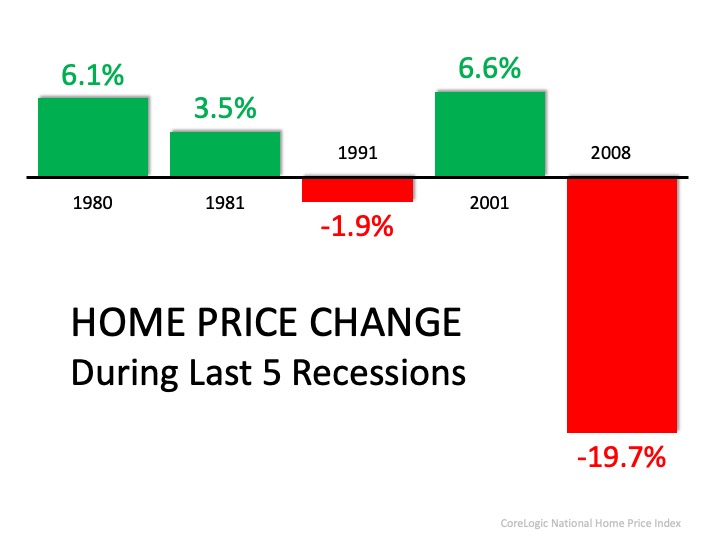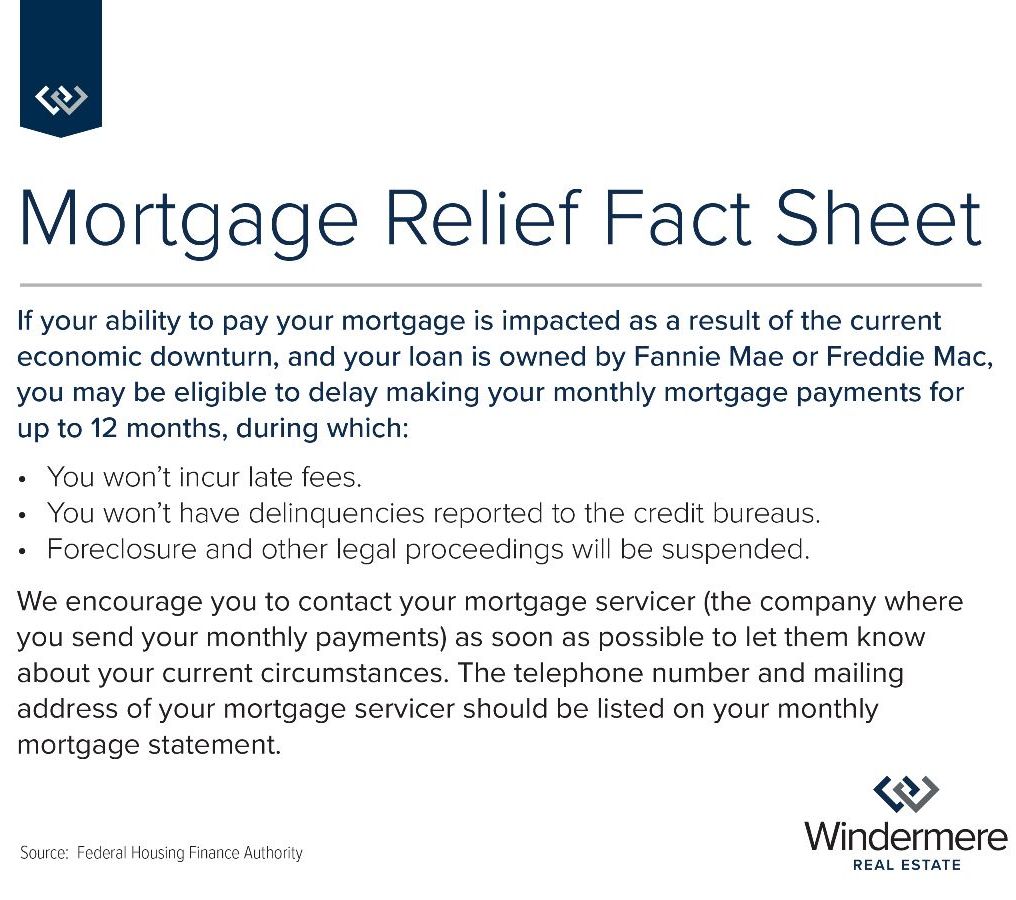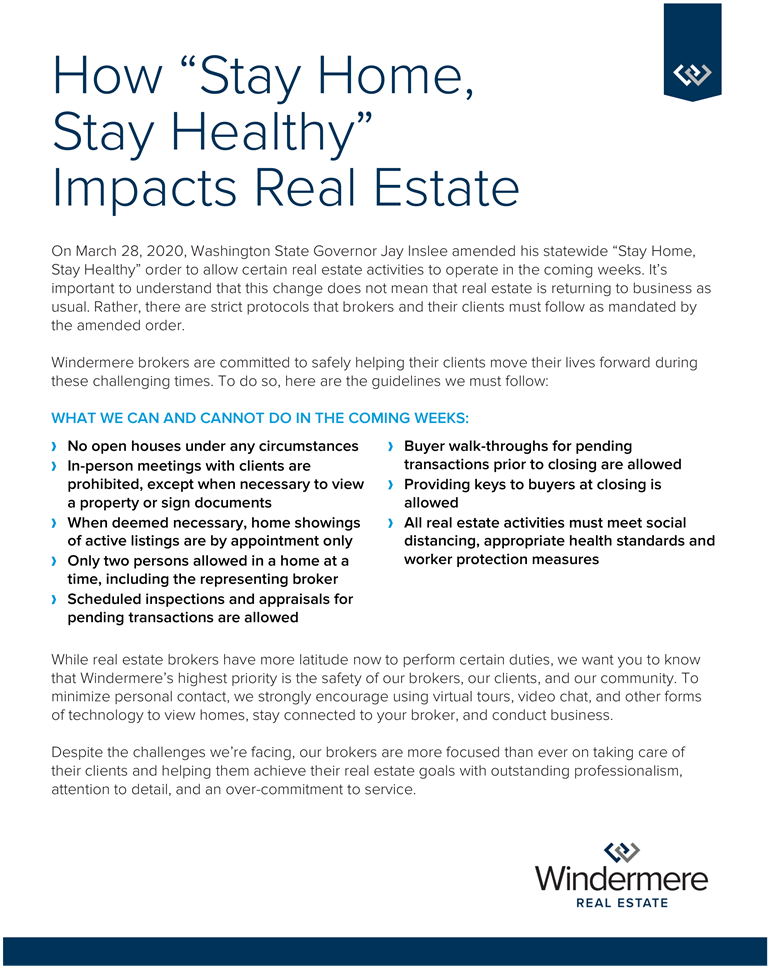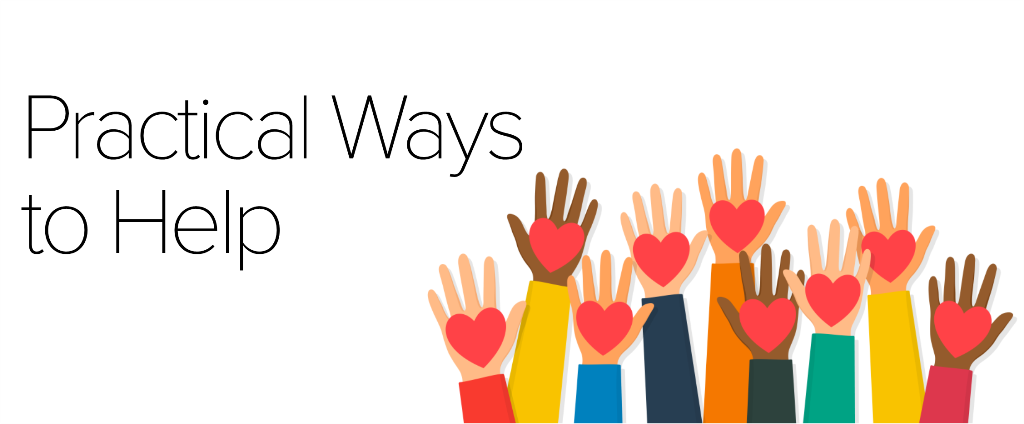I hope this newsletter finds you and yours feeling well and making the best of the Stay Home, Stay Healthy order. It has been my goal as we navigate the COVID-19 pandemic to help keep my clients informed on how this is affecting real estate. I have received many inquiries asking about how the real estate market in our area is faring during this time. Fortunately, I have access to Matthew Gardner, Windermere’s Chief Economist on a weekly basis. Matthew’s one of the most respected economists in the nation, specifically in relation to housing. Last week, I had the opportunity to sit in on a Zoom meeting with him and my colleagues to learn more about COVID-19 and the Western Washington real estate market, and I found his outlook reassuring. Below is the latest edition of a weekly video series that he is recording each Monday to help keep everyone informed and connected to meaningful data. Matthew Gardner and Steve Harney, another economist on the East Coast, are who I am looking to for answers in contrast to just turning on the news or reading the latest headlines. Please click on the image below to listen to Matthew. If you have any questions or want to discuss how this might affect your real estate position specifically, please reach out! It has always been my goal to help keep my clients informed and empower strong decisions, now more than ever.
The effects of the COVID-19 pandemic have surely been felt economically. A common question that I have been asked is, “Is this 2008 all over again?” The answer is “No!” As Matthew touched on above, this is a health crisis, not a housing crisis. Yes, we are headed toward a recession, but not one that is based in housing like The Great Recession of 2008. That recession was primarily based on predatory lending practices that put people into homes they could not afford with little to no down payments and horribly vetted credit. In fact, of the last five recessions, three did not see price depreciation in housing.
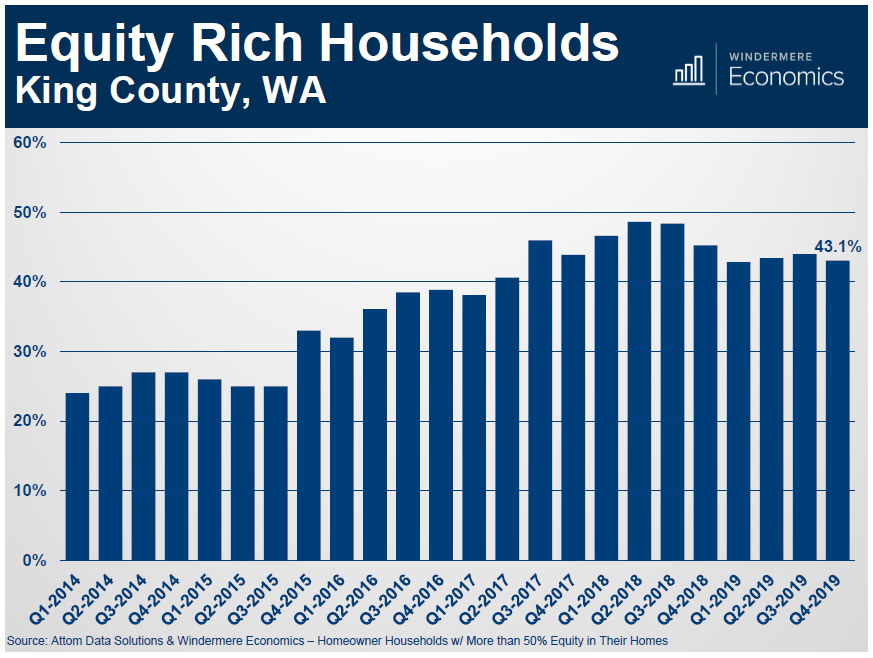 Take a look at the graph to the right, which shows the homeowner households in King County with more than 50% equity in their home. In Q4 of 2019, 43% of homeowners in King County were in a very healthy equity position, owing less than 50% of what their home was worth. I have been tracking sales weekly since March 1st, and prices remain strong. We have a very limited amount of inventory, rates remain low, and buyer demand is being fueled by these positive components. Our economy was formidable prior to this, indicating solid bedrock for recovery once we weather this storm that needs to be waited out. The Greater Seattle Area is particularly fortunate as many of our large businesses are centered in information technology and Amazon, which have both stayed active during this time.
Take a look at the graph to the right, which shows the homeowner households in King County with more than 50% equity in their home. In Q4 of 2019, 43% of homeowners in King County were in a very healthy equity position, owing less than 50% of what their home was worth. I have been tracking sales weekly since March 1st, and prices remain strong. We have a very limited amount of inventory, rates remain low, and buyer demand is being fueled by these positive components. Our economy was formidable prior to this, indicating solid bedrock for recovery once we weather this storm that needs to be waited out. The Greater Seattle Area is particularly fortunate as many of our large businesses are centered in information technology and Amazon, which have both stayed active during this time.
Another aspect that is different from the 2008 Great Recession is that some banks and mortgage investors (servicers) are working with homeowners to provide mortgage relief. With the shutdown of so many businesses and services, job losses have been abundant. If you or someone you know would benefit from setting up a mortgage forbearance program or loan modification in order to alleviate the pressure of monthly payments right now, click on this link and have them contact their mortgage servicer today. The available programs that are offered will vary from one loan servicer to another, and are primarily available for loans that are owned by Fannie Mae or Freddie Mac (click on the appropriate link to help research who owns your loan). Make sure you consider the details and payback terms for your long-term financial health. The ability to protect this asset while waiting this out will protect one’s equity. This is a milestone opportunity and will ensure a strong housing market moving forward.
On Saturday, March 28th, Governor Inslee adjusted the Stay Home, Stay Healthy order in relation to how real estate services can be provided. The point of this was to get the 17,000 pending transactions in our state headed towards a successful close. This also opened up the option for real estate to transact in order to help homeowners who need to sell to become unstuck, and buyers who need housing to be placed. The adjustments were focused on creating safe housing and addressing economic needs. This is not business as usual and now more than ever, entering into a real estate purchase or sale takes a well-thought-out strategy. Public health and safety have become a part of that strategic plan and are of the highest priority to consider along with housing and financial needs. In fact, waiting it out will be the best choice for some. If you or someone you know needs some guidance or is in a position to buy or sell during the Stay Home, Stay Healthy orders, please reach out. Also, see below the restrictions that are in place to help ensure all of our safety.
The uncertainty of COVID-19 and all of its repercussions may leave you feeling helpless or anxious. Sometimes it might feel like the only thing we can do is stay home and wait. The good news is that there are some practical ways we can all help.
1. Give blood, if you can. Blood banks nationwide are in a state of crisis, with severe shortages due to an unprecedented number of blood drive cancellations. Even if your area has ordered residents to stay at home, going out to give blood is allowed as a volunteer activity to help meet essential needs. Go to Bloodworks Northwest or The American Red Cross to schedule an appointment.
*Blood banks are operating by appointment only to meet social distancing orders. Important note: Coronavirus has not been shown to be transmitted through blood transfusion.
2. Give to your local food bank. Cash or food donations are imperative right now, with so many of our neighbors out of work and facing economic uncertainty. You can do an online search for the closest food bank to you, or check out one of these local pantries.
Concern for Neighbors (Mountlake Terrace)
Lynnwood Food Bank
Edmonds Food Bank
Mukilteo Food Bank
Volunteers of America (Everett)
Snohomish Food Bank
Woodinville Storehouse
Canyon Hills Food Bank (Bothell)
Hopelink (Shoreline)
3.Donate to health care workers. Now more than ever before, we need to support our front-line healthcare workers, who are so bravely fighting COVID-19 and taking care of our sick loved ones. Most hospitals have a donation page, outlining what they are currently in need of. Not only are they desperate for personal protection equipment such as gloves and masks, but many facilities are also accepting food (snacks for health care workers), notes of encouragement, or monetary donations. Do a quick search for the hospital nearest you to see what they are lacking and how you can help. Here are a few to get you started.
UW Medicine
Swedish Hospital
Evergreen Hospital
4. Support local businesses. It is often said that small businesses are the backbone of America. Well, now is the time for us to rally and support the bedrock of our communities. Many restaurants are still open for take-out or delivery (have you tried Uber Eats, or Grubhub? These are great options, as you are not only supporting the corner pizza place, but the delivery driver as well), and many local shops are still selling online or offering curb-side pickup.
Some cities are rallying around their restaurants and shops by putting together a one-stop resource for who is open and what services are still available. I have linked a couple of local city’s lists below, including a very cool interactive map for the city of Seattle. For information on your city, try searching Facebook or looking up the city’s Chamber of Commerce website.
Seattle
Edmonds
Bothell / Kenmore
Everett
Take the challenge: the next time you think about ordering something on Amazon, stop and take a minute see if a local small business can fill that need for you instead.

 Facebook
Facebook
 X
X
 Pinterest
Pinterest
 Copy Link
Copy Link


